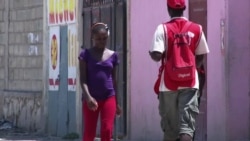Haiti has been plagued with the highest prevalence of HIV infection in the Western Hemisphere. While it has declined significantly – from nearly 10 percent of those screened a decade ago to 3.7 percent as of 2012 – AIDS-related deaths have taken a toll on the Caribbean nation’s children. Roughly 100,000 of those age 17 and younger are orphans of the disease, according to the most recent count provided to UNICEF.
Some 12,000 of Haiti’s youngsters are infected, with many contracting the disease from their mothers, the United Nations' program UNAIDS reports. Two children are born with HIV every day through mother-to-child transmission.
Fear and misunderstanding worsens the disease’s impact, as Venise Louis knows.
A slender, pretty 21-year-old, Venise was 11 when her mother died of what she later learned was an AIDS-related illness. The girl was left orphaned and living with an aunt in Port-au-Prince.
Venise remembers that, as a child, she was weak and often sick. Her aunt usually treated her ailments at home. But when she became gravely ill, Venise was taken to Gheskio Centers, an HIV/AIDS-focused health institution, where she tested positive for HIV infection.
Venise, then 14, found no comfort at home.
“My aunt’s boyfriend told her to separate everything I used: silverware, glasses, soap,” Venise recalls. “I slept in a separate part of the house, and I couldn’t play with the other kids.”
Her aunt would not allow her to attend school, fearing she could infect another child if she had a cut or scrape.
“They told me that if I did not do what they say, they will kick me out of the house and I will be in the streets, like a prostitute, sleeping with men,” Venise says of her aunt and the boyfriend. “And they will not accept me back.”
Needed medical care
She begged her aunt to take her for medical treatment.
“I used to cry a lot every day,” Venise says. “My aunt told me the only way I am going to get treatment is under the earth when I am dead.”
She moved in with another aunt, who sporadically took her for treatment at a hospital. There, a nurse referred her to a psychologist, and Venise disclosed the mistreatment at home. The psychologist suggested placing her at a home run by Caring for Haitian Orphans With AIDS Inc., a nonprofit charity.
Venise arrived at the orphanage in 2009 physically underdeveloped, bone-thin and weak. She was shy, withdrawn and cried a lot.
“I did not feel good at all. I did not feel like a normal person,” she recalls. “And by the way my aunt treated me, I thought life wasn't meant to be good for me.”
‘Focus on living’
That changed at CHOAIDS, whose “entire existence is working against stigma,” Marie Denis-Luque, the organization’s founder, says in an email to VOA. “We deal with stigma by ... making life as normal for the kids as possible.
“For instance, we do not have a sign to identify the type of work we do at the house. We do not focus so much on disease. Rather, we focus on living.”
All 19 children at the orphanage attend regular schools, Denis-Luque says. Venise, who’s finishing the fourth grade, “has learned to read and is very dedicated to her education.”
When she’s not studying, Venise helps with household chores, including preparing meals for the entire household when the cook is off duty. She’s learning to crochet and bake.
Denis-Luque says CHOAIDS also educates the young residents about HIV, the importance of taking their antiretroviral medications, “and what happens if they do not take them, and we prepare them for the future.”
The children receive their antiretroviral pills twice a day.
“When she started getting regular treatment, she started to gain weight,” the orphanage’s director, Frantz Herold, says of Venise. “She started to get better physically and mentally.”
She also got treatment for tuberculosis, Denis-Luque says. HIV is the strongest risk factor for developing TB, according to UNAIDS. TB, an opportunistic disease, can impair lung function and waste the body.
An uncomfortable reunion
At VOA’s request, Venise’s aunts agreed to visit her at the orphanage. One of them, Genese, denies any mistreatment of the girl: “If somebody told you that, it is not true. Especially when she was sick, we never abused her.”
Venise remembers things differently: “If they say they did not do that, then they are lying, because they did.”
Her aunts want to put the past behind them, but Venise still harbors too much pain and anguish to forget.
“When I become older, I will let them know what they did to me was wrong,” she says. “For now, I want to finish school, learn a trade and never go back to live with my family again.”
Someday, Venise says, she hopes to work at the orphanage to help other young people living with HIV.
VOA's Carol Guensburg contributed to this report.







